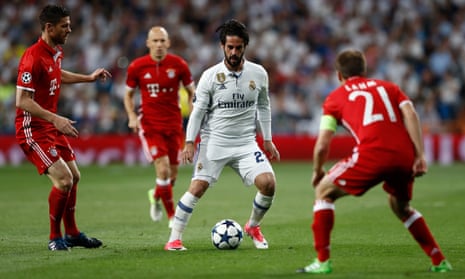Isco has always had a wonky walk. “Odd,” he has called it: feet twisted, legs bendy, hips rolling, backside slung low – and still completely in control of the ball, never far from his foot. It was Iker Casillas and Sergio Ramos who first called him “Magia” but soon everyone in the Real Madrid dressing room followed – and you have to have something a little special if they are calling you magic. Or if Zinedine Zidane, that ballet dancer in boots, says “he can do things very few players can do”.
Francisco Alarcón reckons neighbours knew him as the kid that went everywhere with a ball. “My football comes from the streets,” he says; played in the plaza by his home with his older brother and his mates and on the gravel pitches of Atlético Benamiel.
In Benalmádena, they confirm it. One talks about how even when the other boys were not around, he would be out there doing kick-ups on his own. Another says: “He was always capable of doing magic: it didn’t matter if it was on the pitch or walking back home from school, there was always a ball at his feet.” There, at least, not much has changed: “What I want is the ball,” Isco told El País when he was first called to the Spain squad in 2013.
Not that his progress to that point was smooth, and his progress since has not been either. “Ever since we were kids, we used to say to ourselves: ‘If he doesn’t make it, we’ll never know anyone who does’ – you could see he was special,” a friend says. “The funny thing was, at the time there were scouts constantly watching him but no one used to call him, [people] used to say because of the bandy legs, [or] he’s too slow. Well, I don’t think he’s done too badly.”
If that was really was the reason, it shouldn’t have been. “I don’t care how someone walks down the road, I don’t care what he looks like when he’s out with the dog; I care how he plays,” says Antonio Fernández, the sporting director who signed Isco for Málaga from Valencia, just as he was turning 19.
At €5m he was expensive, a kid from the third division who had played only a handful of first-team games, and there were doubts. He had been given few opportunities at Valencia, then coached by Unai Emery, where his style did not fit. Some questioned his approach: all talent, not enough temperament.

Fernández, though, knew Isco from the Spain youth set-up and was sure. “He was a good kid with spectacular talent. I knew that with patience it would work.” With the right team, too: Manuel Pellegrini’s Málaga played with possession and patience, accumulating men inside. By the end of the second season, in which they were seconds from a Champions League semi-final, that €5m became €30m. Pellegrini wanted him at Manchester City, but Isco admitted later “Madrid is Madrid” – and that from someone with a fondness for Barcelona and a Labrador called Messi. “I called him that because Leo Messi is the best in the world and so is my dog,” he explained.
Isco’s doubts at the time focused on opportunity. At Madrid, the demands were huge and the competition was fierce, he knew, but opportunities would be fewer than he imagined. His start was good, Carlo Ancelotti soon saying that one day in the future Isco could be “very close” to Zidane. But for that to happen, he would need a continuity that never really came.
Isco’s initiation ceremony involved him standing on a chair and singing the nonsense pop song Aserejé (aka The Ketchup song) by Las Ketchup in front of his team-mates. “I nailed it,” he would later grin but there’s something in the fact that the same night Gareth Bale gave a rendition of Yellow Submarine. His presence with Karim Benzema and Cristiano Ronaldo contributed to limiting Isco’s opportunities. It was not that he lacked talent, nor that he rarely started and certainly didn’t get continuity; it was that the No10 role he coveted, close behind the forwards, did not even exist.
It does now, three years on. For now, at least. Bale’s injury gave Isco an opportunity and he took it. With the personnel change came a shift in formation too, an extra man in midfield, greater control, a very different look. For Isco there is a very different outlook: he had been unsure about renewing his contract at the club, keen to play more, but after the final game of the season when Madrid won the league at Málaga, where he was withdrawn to a standing ovation, he insisted: “Relax, I’m staying.”
Relax was the word, too. Spanish and easy to like, entertaining to watch, Isco has always been popular with the fans, as well as protected by some in the press, but his support had grown and those who backed him had been proven right. No one wants to lose him now, and they had started to fear they would. “I started the season with doubts but with trust of the manager and team-mates, it’s finished in the best possible way,” he said. “I feel comfortable. I’ve had more continuity.” Over the last two months he has arguably been Spain’s outstanding player, his impact enormous.
Before the semi-final against Atlético, Dani Carvajal described Isco as “pure fantasy”, but there is more. If those are words that could even have been held against him once, not any more. In the autumn, he insisted: “I’m not stupid: if I have not been a starter with Ancelotti, Benítez and Zidane, it’s my fault.” There is perspiration to go with inspiration now, a real purpose; control, productivity and leadership, something of those days, where one team-mate recalls him “walking round everyone” and another says: “It didn’t matter how the game was going, we never used to panic; however difficult it was, he always wanted the ball, never gave in, and created things that only he could.
In February last year, the former Real Madrid player Iván Helguera said: “Isco doesn’t give assists, he’s not good in the air, he doesn’t win the ball back. He could give much more, but the Bernabéu applauds him for doing a ‘croqueta’ [a piece of skill in which you switch the ball swiftly from one foot the other and back again]. What do his moves end up as?”
Isco has 11 goals and eight assists this season: of those, five goals and three assists have come in his last seven starts. Besides, the answer is a La Liga title and a Champions League final. On the final day, he provided the assist that took Madrid to the title and it was his goal that aborted Atlético’s comeback in the European Cup semi-final, effectively securing their passage to Cardiff.
That he even had the chance was a change: on the eve of the quarter-final second leg with Bayern Munich, 21 players in Real Madrid’s squad had played more Champions League minutes than Isco – even Fábio Coentrão. Since then, he has started all three matches; at the Calderón, he finished it. Few doubt that he will start in Cardiff. It will be his third Champions League final, having come on in Lisbon and Milan – where his extra-time performance was extraordinary and vitally important too, keeping and moving the ball for an exhausted team.
With Bale fighting for fitness, there was a debate about whether he would start this one or whether he would be left out, until the Welshman himself effectively ended it, admitting not only that he would accept it if he began on the bench but suggesting he expects it too.
Barring a major surprise, the boy from Benalmádena will walk out with 10 others at the Principality Stadium – a little wonkily, perhaps, but he will. “Isco has been fantastic and I’m happy for him,” Bale said. “If he starts, I’ll be cheering him on.”

Comments (…)
Sign in or create your Guardian account to join the discussion